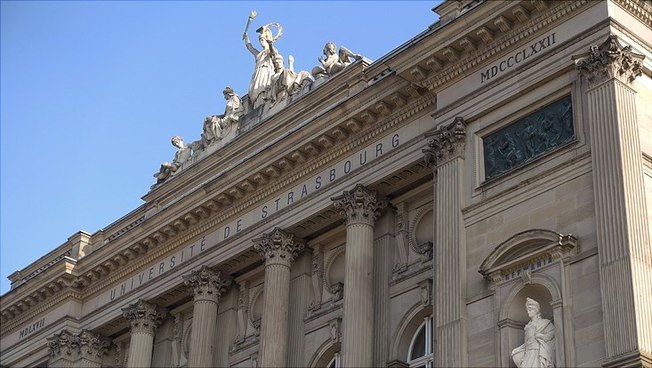28 April 2021
Franco-German Joint ProjectNew Doctoral Program in Structural Biology and Infection Research

Photo: Unistra/Catherine Schröder
The goal of the new Franco-German Integrative Biology of Infection and Diseases (IB-ID) doctoral program is to offer structured training with a focus on the molecular understanding of infection and disease biology using supplementary biophysical tools to investigate cellular, molecular, and structural systems biology. The research project grew out of basic research and should foster greater understanding of infections, thereby facilitating efforts to fight them. Local coordinators at Universität Hamburg and the University of Strasbourg will oversee the program.
Among other things, there are plans for the respective research teams to make both short and long-term visits at each other’s universities, courses on scientific topics, ideas for soft-skills and intercultural topics, and an annual symposium and summer school. Doctoral researchers taking part in the program will be supervised by members of both institutions, ultimately receiving a doctorate from one but recognized by both.
“We are very happy about this success. This binational program will benefit from the unique infrastructure in the life sciences at both universities and foster strong interdisciplinary cooperation,” says Prof. Dr. Arwen Pearson from the Department of Physics at Universität Hamburg. Pearson is one of the program’s supervisors. “Moreover, it will strengthen international cooperation and provide an opportunity to build sustainable educational expertise at the interface between molecular infection research and structural biology,” added Dr. Joern Pütz, deputy vice president for Franco-German relations and biochemist from the University of Strasbourg.
Both universities are designated universities of excellence in their own countries and have had a strategic partnership for the last 3 years focusing on interdisciplinary research and training activities. Strengthening international mobility, including academic and administrative staff exchanges, are also important for future cooperation.
The following researchers will supervise the program for Universität Hamburg: Prof. Dr. Arwen Pearson (physics), Prof. Dr. rer. nat. Dr. Sc., Christian Betzel (biochemistry), Prof. Dr. Kay Grünewald (biochemistry/CSSB), and Dr. Irene Fernandez-Cuesta (physics), all of whom are part of the The Hamburg Centre for Ultrafast Imaging: Cluster of Excellence Advanced Imaging of Matter, Prof. Dr. Zoya Ignatova and Prof. Dr. Daniel Wilson (biochemistry), Prof. Dr. Stefan Hoth and Prof. Dr. Julia Kehr (biology) and Prof. Dr. Tim Gilberger (Bernhard Nocht Institute for Tropical Medicine).
The following researchers will supervise the program for Strasbourg: Dr. Serena Bernacchi and Dr. Claude Sauter (DR2 CNRS—IBMC), Dr. Joern Pütz (deputy vice president for international relations, U Strasbourg—IBMC) and colleagues from other institutes (Institute of Genetics and Molecular and Cellular Biology, Institute of Molecular Biology of Plants, Institute of Biological Chemistry and Physiology and Institute for Research on Viral and Liver Diseases), who also cooperate in the Cluster of Excellence EIT—IMCBio.
The Deutsch-Französische Hochschule (DFH) was founded jointly by Germany and France in 1997 with both governments providing funds of the same amount. The Franco-German University offers both undergraduate and graduate programs as well as a Franco-German program for doctoral researchers and scientific research activities for early career researchers.
